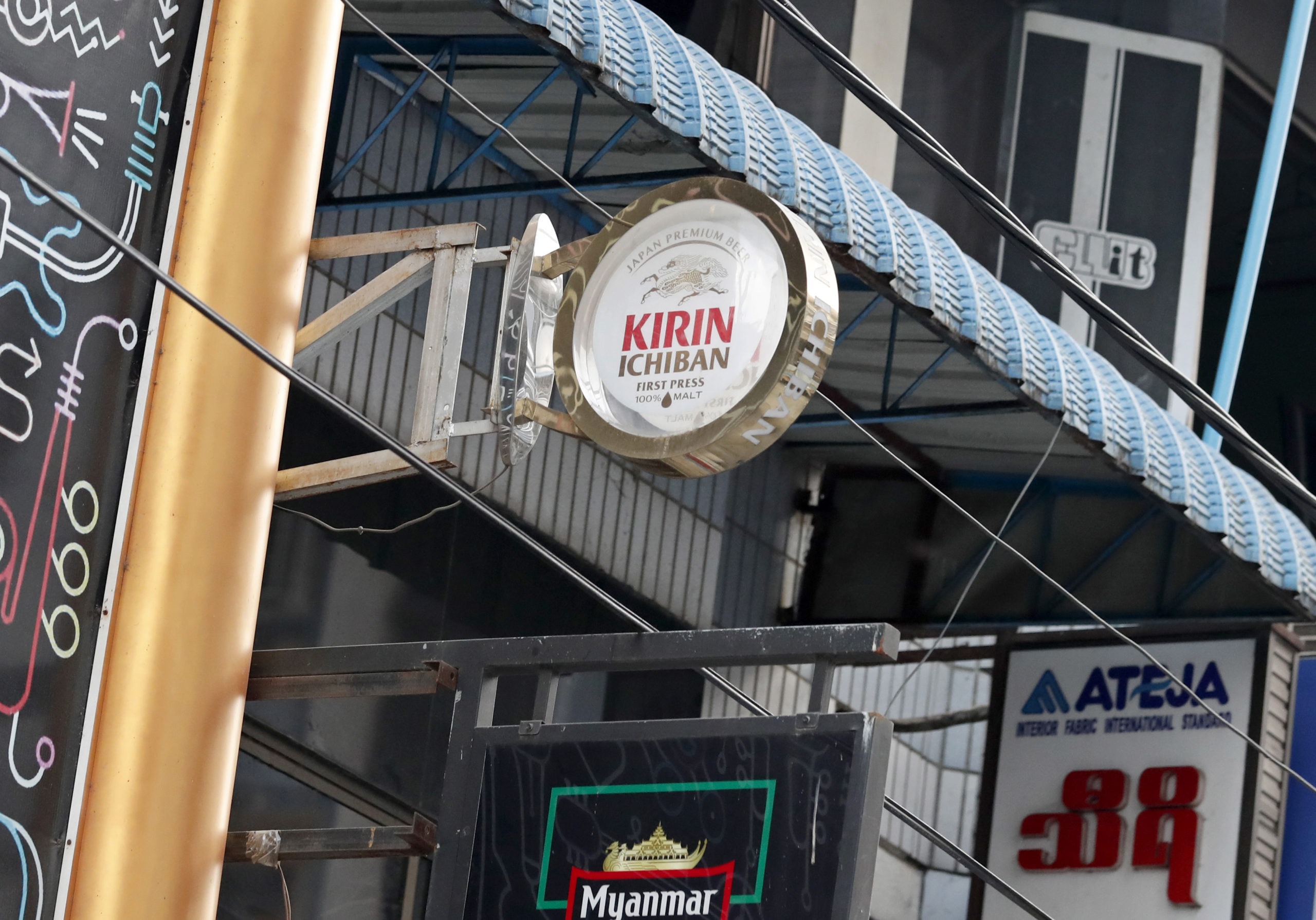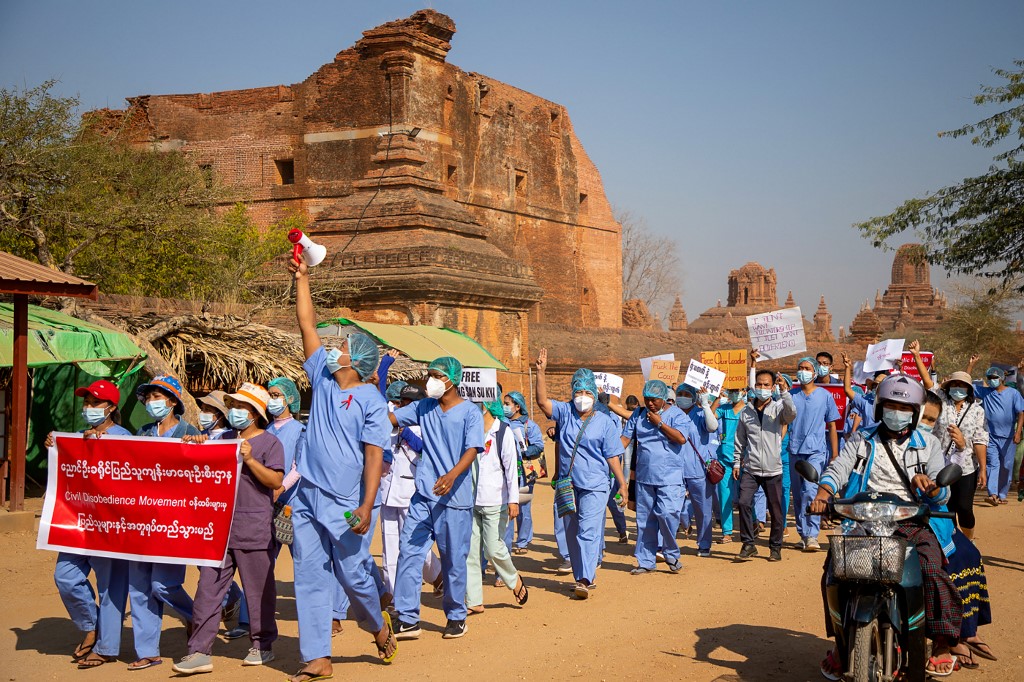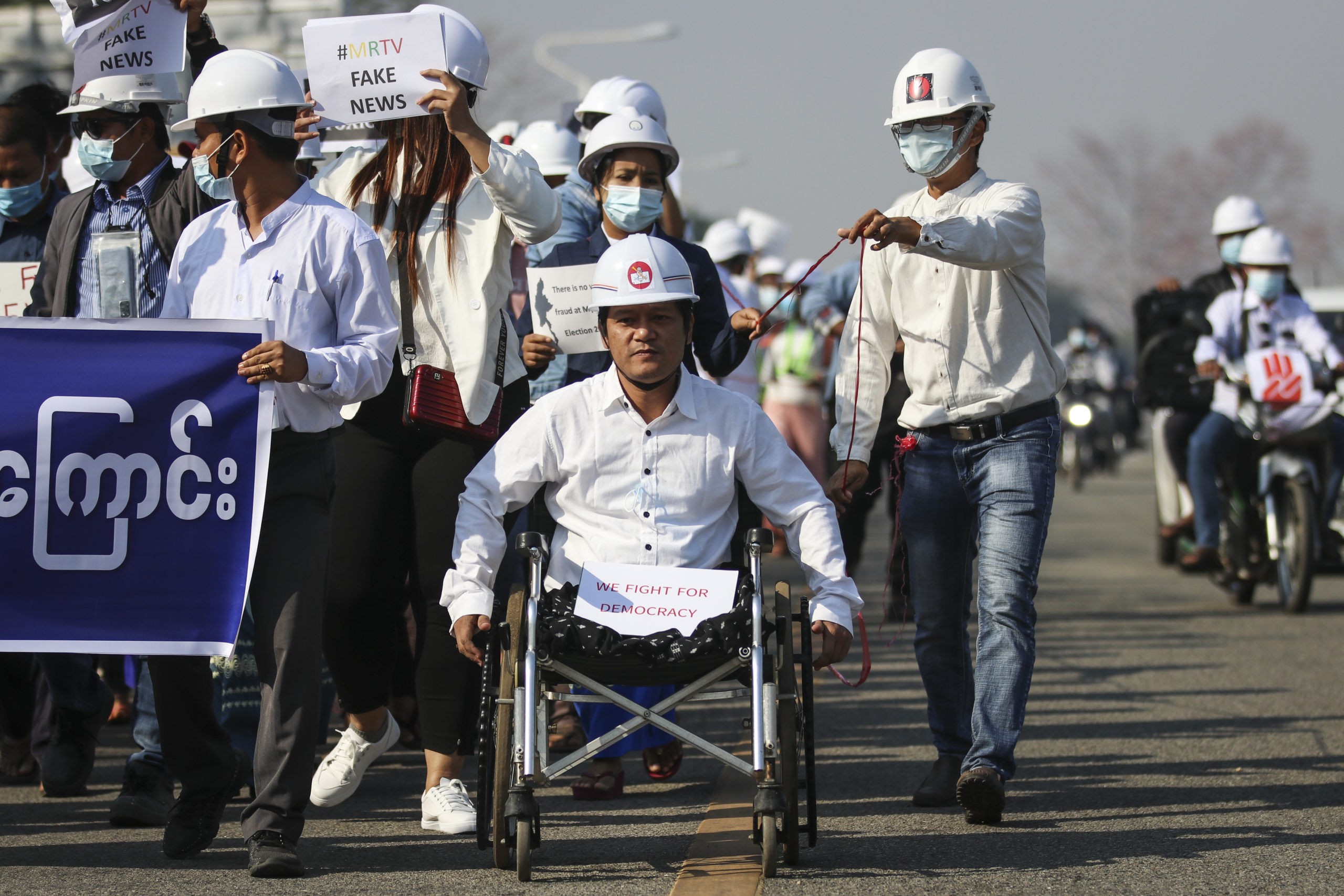Japanese beer giant Kirin Ichiban’s statement last week might have gone under the radar for most, but for some represented years of work and the end of financing Myanmar’s military, the tatmadaw.
On February 5, Kirin announced they would be ending their joint-venture partnership with Myanmar Economic Holdings Public Company (MEHL). In their statement, they referred to MEHL as the military’s welfare fund which would provide pensions, despite their recent inconclusive findings after a year-long investigation of the company and its military connections. This came after $30,000 in donations from Myanmar Breweries were made to military chief Min Aung Hlaing in 2017, two years after Kirin purchased a majority stake in the company.
“[Kirin] is deeply concerned by the recent actions of the military in Myanmar, which are against our standards and Human Rights Policy,” the firm said in a statement.
“I’m still amazed it took this much for Kirin to finally drop the Myanmar military as their partner,” said Simon Billenness, executive director of the International Campaign for the Rohingya (ICR).
Billenness believes efforts from within Myanmar played a part in Kirin’s decision.
“Even in this market of Myanmar that was apparently so valuable to Kirin, that even with the charges of genocide they still didn’t want to give it up,” he told the Globe. “Finally, this boycott is not only affecting their business worldwide, it’s affecting this asset they’ve been protecting in Burma and it’s clearly not going to go away,” he added of Kirin’s decision.
The end of this lucrative partnership for the military comes as strikes and boycotts within Myanmar protesting the coup have also hit their assets, also leaving the international community re-examining their role in the military’s vast economic holdings. Myanmar citizens, as well as the international community, took to social media during the boycott campaign with hashtags #NoBusinesswithGenocide and #CivilDisobedienceMovement.
Whether it’s a national labour strike in key industries, or an international boycott on military-affiliated companies and their products, one thing is clear: The fortunes of the Myanmar economy and the military are closely intertwined. With people’s livelihoods at stake, the debate now is about where and how hard to hit.
U Aung Kyaw Linn, general secretary of union the Independent Federation of Myanmar Seafarers (IFOMS), has been a long-time supporter of boycotting military products.
“The last five or six years, I never drank Myanmar beer, I never smoked their product,” he said, referencing Red Ruby cigarettes. Linn also says IFOMS has been working with their partner, the International Transport Workers’ Federation (ITF), to investigate other military enterprises in the country.

Linn is not alone in his efforts. News on February 3 of the resignation of 71 engineers from a Sagaing region branch of Mytel, a leading telecommunications firm owned by the military, in protest of the coup, garnered support from advocacy groups and citizens alike. Two days later, expose organisation Justice for Myanmar shared photos on Twitter of Red Ruby cigarettes, another military-owned brand, reportedly destroyed in protest by small business owners.
A representative from Justice for Myanmar also pointed to shop owners taking down Mytel signs and burning SIM cards from the company. The organisation, which researches and publishes information on the international links of the Tatmadaw, stresses that economic actions against the armed forces need to be larger than any one individual person or firm.
“It is not only Min Aung Hlaing, but the Myanmar military as an institution that has enriched itself through these military-linked businesses, which allows the military to continue to commit grave international crimes, including war crimes, crimes against humanity and genocide,” an anonymous representative told the Globe.
Given the intertwined nature of the military and the national economy, any outside pressure will need to be well-focused to minimise the impact on average citizens.
Andrew Tillett-Saks, a Yangon-based labour organiser, believes internal mass mobilisations and strikes within the civil service are currently applying the most pressure on the military. The international community would do well to follow their lead, he said, as well as that of Myanmar’s labour unions, when forming its own response.
“I tend to believe that outside allies to the Myanmar people should follow the strategic wishes and should follow the lead of the Myanmar people themselves,” Tillett-Saks told the Globe.
As the world’s attention is fixed on Myanmar, many are finding that the Southeast Asian country and its military are closer to home than they had ever imagined.
Billenness, who’s worked on global boycott campaigns since 1992, knows that many familiar Western brands end up being connected to the Tatmadaw by virtue of expansion into Myanmar.
ICR is a long-time advocate of boycotting Kirin and other companies conducting business with the military, a list of targets that includes jewelry companies, other breweries owned by Kirin, and even Facebook. Similar to former US President Donald Trump’s Twitter ban, both Burma Campaign UK and ICR are calling for Facebook to de-platform the Myanmar military, arguing it makes it easier for the military to recruit soldiers and conduct business.
In April of last year, ICR listed various strategies on their website for pressuring Kirin, including a petition, using online reviews to ask restaurants and bars to stop carrying Kirin products, and using Kirin-affiliated breweries’ job listings on LinkedIn to post opposition to their parent company and discourage job hunters from working for them.
“These kinds of attacks on the reputation of companies and also interference with their hiring process, this really gets under the skin of companies,” Billenness said.

Michael Rosato, owner of restaurant Sospseso, said he wasn’t initially aware of Kirin’s connection to the Tatmadaw but decided to take beers from Brooklyn Brewery off the menu
The strategy seems to be working.
A long-time member of the Interfaith Center of Corporate Responsibility (ICCR), Billenness, then an analyst at an asset management company, worked with ICCR to find shareholders at international corporations doing business in Myanmar, urging them to file resolutions to pull out of the country.
In October of 2019, after organising a group of NGOs to issue a public letter to Western Union, he persuaded an ICCR member, Friends Fiduciary, to file a shareholder resolution in December. Western Union subsequently dropped military-owned Myawaddy Bank as its in-country partner at the start of 2020.
On a local level, Billenness says sharing their message with his local bars, restaurants, and supermarkets in Washington DC has also made an impact.
Michael Rosato, owner of restaurant Sospseso based in the US capital, said he wasn’t initially aware of Kirin’s connection to the Tatmadaw but decided to take beers from Brooklyn Brewery off the menu after speaking with Billenness.
“It seemed like a pretty simple thing I could do, even though it was very small. But I think those can add up, and it was important enough for us to make a decision on that,” Rosato told the Globe.
But as pressure campaigns ramp up, both governments and international companies are faced with the decision of how far economic actions should go and how they might impact the average person in Myanmar. On February 10, US President Joe Biden announced an executive order on sanctions against the leaders of the coup. By formally declaring the military’s actions a coup d’etat, all non-humanitarian aid to the country is now under review.
Advocacy groups such as Justice for Myanmar and Burma Campaign UK, stressed the importance of targeted sanctions like Biden’s that solely pressure the military as an institution.
“We oppose any form of broad, untargeted sanctions against Myanmar which could impact ordinary people” the organisations stated in a recent joint release, listing such broad sanctions as the withdrawal of trade privileges and preferences.
Both organisations are now supporting a call for wide-ranging measures including diplomatic pressure, international legal pressure and a global arms embargo.
“Targeted sanctions on the economic interests of the military will not change the behaviour of the military. It is a tactic, not a panacea,” they stated.

Back in Myanmar itself, trade unionist Linn says he’s been protesting with other union members outside UN offices and the US embassy in Yangon.
“Our union role is, I think, the front line against [the] military,” Linn said.
Many labour unions in Myanmar have loudly opposed the coup, both in-person and in the form of statements condemning the power grab. Tillett-Saks says the unions were among the first to begin protesting in the streets while the country waited for a call to action from NLD.
“The sight of thousands of industrial workers, mostly young women workers, protesting the coup seems to have inspired the Myanmar public and broken down some of their fear,” he said.
In a statement posted to Facebook on February 10, U Maung Maung, president of the Confederation of Trade Unions Myanmar (CTUM), called for global worker solidarity, calling for the “international trade union and its members to isolate the military attache offices of Myanmar in your country”.
The increasingly political role of organised labour has bolstered the strength of the protest movement, while also attracting negative attention from the tatmadaw. Earlier this week, Linn says, police and military searched the homes of some of his colleagues from other unions, detaining at least one person.
The Confederation of Trade Unions Myanmar (CTUM) has condemned a house search conducted on Ma Moe Sandar Myint, a leader of the Federation of General Workers Myanmar.
Linn wants to see the release of the civilian NLD government and a total removal of the military by any means necessary. He believes any form of negotiation with the Tatamadaw will only further legitimise the regime.
“I support every movement [that is] anti-military,” he said. “Whether you’re just online, on strike, on protest.”
Linn isn’t sure that the US’ sanctions will be enough to influence change as the military has experienced them before. In the meantime, he’s focused on his internal boycott efforts, the unfolding Civil Disobedience Movement, and working with other unions to make their voices heard.
“So many organisations, even the people from here, they show their will against [the] military,” he said. “They don’t want a military regime, so every possible way, we’re thinking about. Our first priority is the CDM.”


